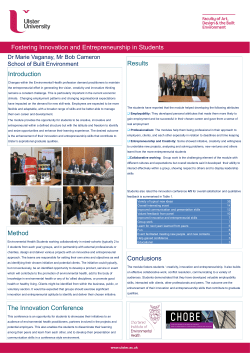
THESIS PROJECT - Labex Entreprendre
____________________________________________________________ PhD co nt rac t THESIS PROJECT Academic year: 2015 1. Topic Thesis title “The new business model for entrepreneurial support: What is the reality?” Key words Entrepreneurship, types of entrepreneurial support, business creation, project incubator, support structure, private incubator, coworking space, business accelerator, generation Y, innovation, performance 2. Supervision Name Thesis advisor Sylvie SAMMUT Institution University of Montpellier e‐mail sylvie.sammut@umontpellier.fr Research group: MRM Entrepreneurship Committee for the thesis: Name Institution Karim MESSEGHEM University of Montpellier Olivier TORRÈS Jean-Marie COURRENT University of Montpellier University of Montpellier 3. Project presentation This PhD project is part of Project 1: Emergence of Innovation, Program 2: Management and evaluation LABEX ENTREPRENDRE – Université Montpellier – Faculté d’Administration Economique et Sociale Espace Richter ‐ Avenue Raymond Dugrand – CS 59640 ‐ 34960 Montpellier Cedex 2 www.labex‐entreprendre.fr ____________________________________________________________ PhD co nt rac t of support services of LabEx Entreprendre, and the Jacques Cœur Chair for Entrepreneurial Support. This thesis focuses on the transformation currently taking place in the French entrepreneurial support industry. French business incubators have had relatively stable support processes for the past 30 years, but their practices are rapidly changing today. Essentially, they have become more collaborative and more collective and they now offer more complete assistance. Research context Within the European Union, France ranks number one in business creation (INSEE, 2014; Audit Office, 2012). In recent years, French entrepreneurial activity has generated between 500,000 and 550,000 startups per year. Nevertheless, the five-year survival rate of French companies is only 51.5% (INSEE, 2011). The French government has therefore instructed incubators to provide guidance to young companies to improve their chances of survival (Rotger, Gortz & Storey, 2012). The role of incubators has been extensively reported on in the literature (Hackett & Dilts, 2004; Peters & Rice, 2004). Some researchers have specifically analyzed the entrepreneurial support process (Sammut, 2003; Rice, 2002). The factors that contribute to high incubator performance have also generated a research stream (Bergek & Norrman, 2008), and this latter has had an impact on public policies, given the current need for the government to rationalize all spending. Incubators today are facing major challenges that are forcing them to change. One of these challenges is the many new entrepreneurial profiles that are particularly typical of Generation Y. Also, newcomers with new ideas are entering the entrepreneurship market in growing numbers (Carayannis & von Zerdtwitz, 2005; Shah & Pahnke, 2014). Large companies now offer their own "corporate incubators" (Grimaldi & Grandi, 2005), and entrepreneurs themselves are building their own "bottom-up incubators" (Bollingtoft, 2012). The more traditional incubators are thus changing in order to adapt, and new forms of support are emerging. The support offer today tends to be as complete as possible (Bruton et al., 2015; Patton, 2014) and is based on collaborative and collective processes. For example, entrepreneurial networks are a major focus for support (Ebber, 2013; Cakula et al., 2013; Newbert et al., 2013) because networking helps to develop innovation (Barbero et al., 2014). Assessing how effective these new support services are will be a key issue for this research topic because beyond the utility of these structures is the question of their funding. Is a new business model for the incubator industry right now emerging, with a mix of private and public funding? LABEX ENTREPRENDRE – Université Montpellier – Faculté d’Administration Economique et Sociale Espace Richter ‐ Avenue Raymond Dugrand – CS 59640 ‐ 34960 Montpellier Cedex 2 www.labex‐entreprendre.fr ____________________________________________________________ PhD co nt rac t Research methods The objective of this PhD project is to study the current mutation underway in the entrepreneurial support industry. Initially, work on this thesis topic will focus on the components of the new forms of support. It will then be necessary to analyze how well these components perform compared with the more traditional forms of entrepreneurial support. The empirical approach for this research will be carried out via an exploratory qualitative study and a confirmatory quantitative study. REFERENCES Barbero, J. L., Casillas, J. C., Wright, M., & Ramos Garcia, A. (2014). Do different types of incubators produce different types of innovations? Journal of Technology Transfer, 39(2), 151–168. Bergek, A., & Norrman, C. (2008). Incubator best practice: A framework. Technovation, 28(1-2), 20–28. Bollingtoft, A. (2012). The bottom-up business incubator: Leverage to networking and cooperation practices in a self-generated, entrepreneurial-enabled environment. Technovation, 32(5), 304–315. Bruton, G., & Wright, M. (2015). New financial alternatives in seeding entrepreneurship: microfinance, crowdfunding, and peer-to-peer innovations. Entrepreneurship Theory and Practice, 39(1), 9–26. Cakula, S., Jakobsone, A., & Motejlek, J. (2013). Virtual Business Support Infrastructure for Entrepreneurs. Procedia Computer Science, 25, 281–288. Carayannis, E. G., & von Zedtwitz, M. (2005). Architecting gloCal (global–local), real-virtual incubator networks (G-RVINs) as catalysts and accelerators of entrepreneurship in transitioning and developing economies: lessons learned and best practices from current development and business incubation practices. Technovation, 25(2), 95–110. Ebbers, J. J. (2013). Networking behavior and contracting relationships among entrepreneurs in business incubators. Entrepreneurship: Theory and Practice, 38(5), 1–23. Grimaldi, R., & Grandi, A. (2005). Business incubators and new venture creation: an assessment of incubating models. Technovation, 25(2), 111–121. LABEX ENTREPRENDRE – Université Montpellier – Faculté d’Administration Economique et Sociale Espace Richter ‐ Avenue Raymond Dugrand – CS 59640 ‐ 34960 Montpellier Cedex 2 www.labex‐entreprendre.fr ____________________________________________________________ PhD co nt rac t Hackett, S. M., & Dilts, D. M. (2004). A systematic review of business incubation research. The Journal of Technology Transfer, 29(1), 55–82. Newbert, S. L., Tornikoski, E. T., & Quigley, N. R. (2013). Exploring the evolution of supporter networks in the creation of new organizations. Journal of Business Venturing, 28(2), 281–298. Patton, D. (2014). Realising potential: The impact of business incubation on the absorptive capacity of newtechnology-based firms. International Small Business Journal, 32(8), 897–917. Peters, L., Rice, M., & Sundararajan, M. (2004). The role of incubators in the entrepreneurial process. Journal of Technology Transfer, vol 29(1), 83–91. Rice, M. P. (2002). Co-production of business assistance in business incubators: An exploratory study. Journal of Business Venturing, 17(2), 163–187. Rotger, G. P., Gørtz, M., & Storey, D. J. (2012). Assessing the effectiveness of guided preparation for new venture creation and performance: Theory and practice. Journal of Business Venturing, 27(4), 506–521. Sammut, S. (2003). L’accompagnement de la jeune entreprise. Revue Française de Gestion, 144(3), 153– 164. Shah, S. K., & Pahnke, E. C. (2014). Parting the ivory curtain: understanding how universities support a diverse set of startups. The Journal of Technology Transfer, 39(5), 780–792. PREFERRED SKILLS The PhD candidate should be open to a broad range of methodologies and will become very familiar with both the qualitative and quantitative methods required for processing the data collected for this thesis. A good command of English is also required for reading the relevant international literature and writing up the research findings. The candidate should also have an interest in cross-sectional approaches. LABEX ENTREPRENDRE – Université Montpellier – Faculté d’Administration Economique et Sociale Espace Richter ‐ Avenue Raymond Dugrand – CS 59640 ‐ 34960 Montpellier Cedex 2 www.labex‐entreprendre.fr ____________________________________________________________ PhD co nt rac t 4. Thesis financing Labex Entreprendre will fully fund this PhD position for three years. LABEX ENTREPRENDRE – Université Montpellier – Faculté d’Administration Economique et Sociale Espace Richter ‐ Avenue Raymond Dugrand – CS 59640 ‐ 34960 Montpellier Cedex 2 www.labex‐entreprendre.fr
© Copyright 2025












